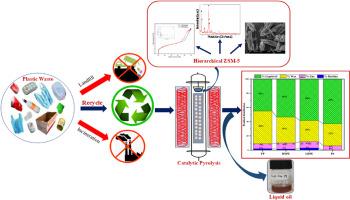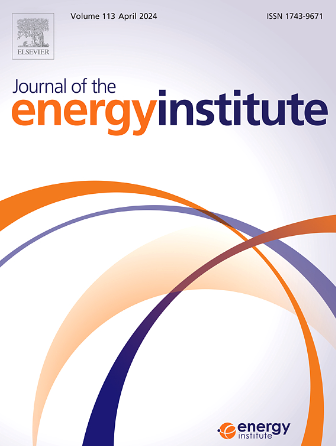Probing the influence of synthesized hierarchical ZSM-5 catalyst in ex-situ catalytic conversion of real-world plastic waste into aromatic rich liquid oil
IF 5.6
2区 工程技术
Q2 ENERGY & FUELS
引用次数: 0
Abstract
Plastic waste management has become a vitally important environmental and economic concern for researchers and technologists worldwide. Currently, catalytic pyrolysis of plastic waste emerged as a promising plastic waste management technique, further aiding the full-scale development of an alternate innovation to convert plastic waste into fuel (liquid oil) energy. Lately, zeolites have been one of the most suitable and versatile catalysts in converting plastic waste into fuel grade hydrocarbons via catalytic pyrolysis. The present work exhibits an attempt to synthesize and study the performance of a hierarchical ZSM-5 in a fixed bed reactor to convert the real-world (LDPE, HDPE, PP and PS) plastic wastes into higher quality fuel grade liquid oil. The hierarchical ZSM-5 catalyst having both mesopores and micropores (dual porosity) in its framework is synthesized by using a single organic template i.e., 10 % tetra propylammonium hydroxide (TPAOH). The catalyst performance study displays remarkable selectivity and increase in the yield of the aromatic component in the liquid oil obtained from different plastic wastes. The results indicate that presence of hierarchical catalyst has exceptionally lowered the reaction temperature in the range of 400–430 °C and increased the liquid oil yield in comparison with that of the thermal pyrolysis. Also, the obtained liquid oils have comparable fuel properties with that of kerosene and diesel.

探究合成分层 ZSM-5 催化剂在将现实世界中的塑料废弃物原位催化转化为富含芳香烃的液体油中的影响
塑料废弃物管理已成为全球研究人员和技术人员关注的一个极其重要的环境和经济问题。目前,塑料废弃物催化热解已成为一种前景广阔的塑料废弃物管理技术,进一步推动了将塑料废弃物转化为燃料(液态油)能源的替代创新技术的全面发展。最近,沸石已成为通过催化热解将塑料垃圾转化为燃料级碳氢化合物的最合适、最通用的催化剂之一。本研究尝试在固定床反应器中合成分层 ZSM-5 并研究其性能,以将现实世界中的塑料废物(LDPE、HDPE、PP 和 PS)转化为更高质量的燃料级液体油。分层 ZSM-5 催化剂的框架同时具有中孔和微孔(双孔隙率),是通过使用单一有机模板(即 10% 四丙基氢氧化铵 (TPAOH))合成的。催化剂性能研究显示,从不同塑料废料中获得的液态油中,芳烃组分具有显著的选择性并提高了产率。结果表明,与热热解相比,分层催化剂的存在大大降低了 400-430 °C 的反应温度,并提高了液体油的产量。此外,获得的液体油具有与煤油和柴油相当的燃料特性。
本文章由计算机程序翻译,如有差异,请以英文原文为准。
求助全文
约1分钟内获得全文
求助全文
来源期刊

Journal of The Energy Institute
工程技术-能源与燃料
CiteScore
10.60
自引率
5.30%
发文量
166
审稿时长
16 days
期刊介绍:
The Journal of the Energy Institute provides peer reviewed coverage of original high quality research on energy, engineering and technology.The coverage is broad and the main areas of interest include:
Combustion engineering and associated technologies; process heating; power generation; engines and propulsion; emissions and environmental pollution control; clean coal technologies; carbon abatement technologies
Emissions and environmental pollution control; safety and hazards;
Clean coal technologies; carbon abatement technologies, including carbon capture and storage, CCS;
Petroleum engineering and fuel quality, including storage and transport
Alternative energy sources; biomass utilisation and biomass conversion technologies; energy from waste, incineration and recycling
Energy conversion, energy recovery and energy efficiency; space heating, fuel cells, heat pumps and cooling systems
Energy storage
The journal''s coverage reflects changes in energy technology that result from the transition to more efficient energy production and end use together with reduced carbon emission.
 求助内容:
求助内容: 应助结果提醒方式:
应助结果提醒方式:


